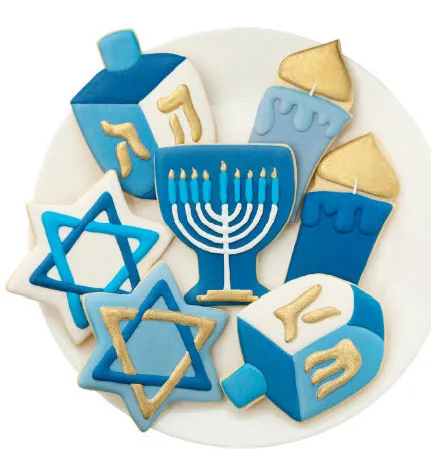Chanukah: A Time to Reflect and Rejoice
Written by: Liz O’Neill, Executive Committee Member on the JFS Delaware Board of Directors
More years ago than I care to acknowledge, my family traveled to Israel in late December to celebrate my younger sister’s Bat Mitzvah. Having grown up in a suburb of Boston where Jews were a minority, the very first thing I remember being aware of was the sight of a huge menorah as our El Al flight touched down at Ben Gurion Airport. Not a Christmas tree, not wreaths, no red and green lights! For the first time, I considered what it would be like to experience being in the majority, of having Jewish holidays celebrated by the larger community.
As a child, Chanukah played an important role in my life. My parents, sister, grandparents, aunts, uncles, and cousins gathered for festive dinners and enjoyed lighting the menorah and exchanging gifts together. Celebrating Chanukah was a great antidote to the ubiquitous Christmas music on the radio and Christmas decorations that adorned our town. Admittedly, I sometimes longed for a Christmas tree to decorate and stockings to stuff, but I always reminded myself of the Chanukah traditions I loved. I appreciated that every year, one of the gifts my parents gave my sister and me was the opportunity to give tzedakah; she and I chose a charity that touched our hearts. Some years, we donated to an animal shelter, other years it was a non-profit that helped individuals and families experiencing homelessness or health issues. 
I recall learning about Chanukah in Sunday School – the Jews’ triumph over their Greek oppressors, the rededication of the Temple in Jerusalem, and the small amount of oil that miraculously lasted eight days. To me, it was, and remains, a powerful story of Jews’ resilience and fortitude. Chanukah serves as a reminder that the ostensibly strong do not always prevail and that “miracles” (or I would say – unexpectedly good things) can happen.
Israel and Chanukah are inextricably linked, not only because the Maccabean Revolt and the miracle of the oil took place there. It is also symbolic. Both Israel, as a country, and Chanukah, as a holiday, represent religious freedom, standing up for what is right, and determination. The modern-day creation of Israel is, in some sense, a miracle, and its continuation is miraculous. Jews constitute just 0.2% of the world’s population, yet we have our own homeland.
As an adult, many of the Chanukah traditions I grew up with remain but have taken on different forms. Because my husband and stepchildren were raised Catholic, our family celebrates both Chanukah and Christmas. I have found myself navigating and appreciating all the various traditions and customs of the holidays. When we decorate the Christmas tree, the very first thing I do is hang a Star of David ornament that my stepdaughter gifted to me years ago. The glow of the menorah (passed down to me from my paternal grandparents – about a century old) often has the glow of our Christmas tree lights in the background. We eat chocolate gelt and also Christmas cookies. And as I light the shamash, there are multiple Santa Claus figurines “listening” to the blessings.
While the menorah lighting observance likely began years after the Hasmonean victory, it doesn’t diminish the meaning of bringing light, both literally and metaphorically, into darkness. I have read the reason Chanukah lights are traditionally placed near a window is so people on the outside can see the brightness and be reminded of how that even during times of darkness, light can be found. As fall turns into winter in the Northern Hemisphere, the illuminations and festivities of the season make the darker afternoons brighter. Sharing our light, as well as our traditions, with others is special, meaningful, and truly enlightening.
I love that Jews around the world celebrate Chanukah at the same time and with similar traditions. We all use the shamash as the “leader” candle to light each candle as we say the blessings. Many of us eat latkes, sing songs, and exchange gifts. However, the dreidels we have here are slightly distinct from the ones that families in Israel spin. The Hebrew letters on my dreidels represent “A great miracle happened there.” And, in Israel, the Hebrew letters represent “A great miracle happened HERE.”

